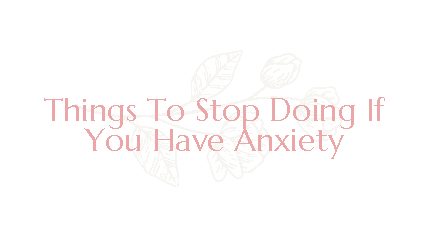People with high anxiety often experience short-term memory loss because of the excessive elevation in cortisol levels.
Anxiety and Memory Loss

An Anxious Girl in A Scary World
This blog was created to help individuals with an anxiety disorder and who are looking for support.

People with high anxiety often experience short-term memory loss because of the excessive elevation in cortisol levels.

Trying to successfully manage your anxiety every day is no small feat. It takes a lot of energy day in and day out, and after a while it can begin to take a toll on you mentally and physically. To help you better manage your anxiety there are a few things that you should stop doing.

With the start of the new school year fast approaching, that means the back to school anxiety is fast approaching as well.

Each person with anxiety has one or more triggers that sets their anxiety alarm off. The triggers can vary from person to person and can vary depending on what type of anxiety they are dealing with. It’s important to be able to recognize those triggers so that individuals can best decide what course of action they should take to bring about relief.